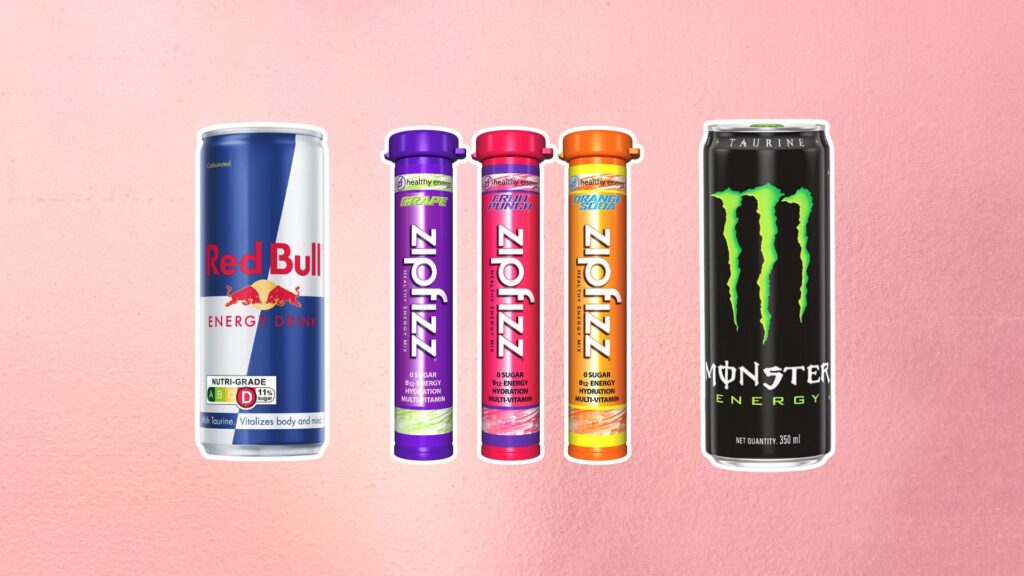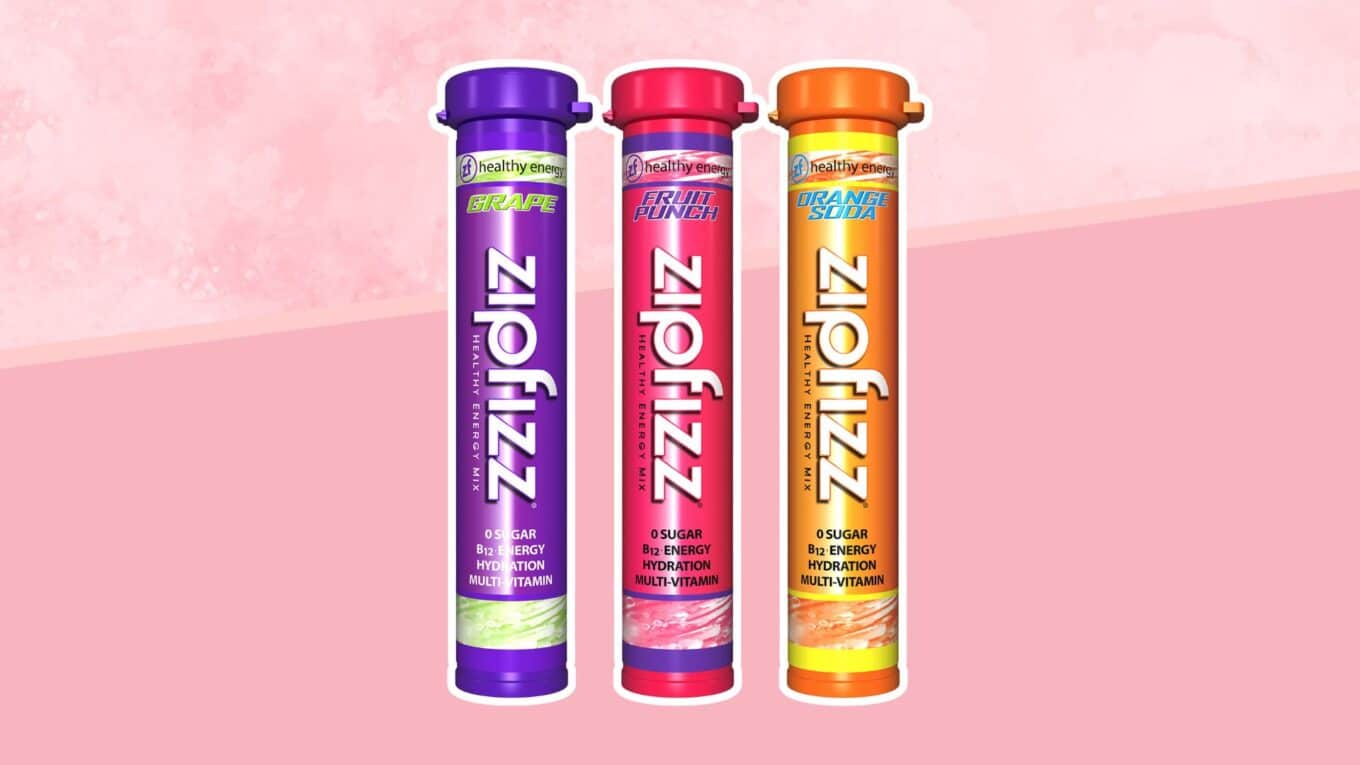Many people turn to energy drinks for a quick boost in today’s fast-paced world.
However, not all energy drinks are created equal, and some may have negative health consequences.
Zipfizz, a popular powdered energy drink mix, offers a healthier alternative to traditional energy drinks.
In this article, we’ll examine Zipfizz and compare it to other energy drinks on the market.
We’ll examine the ingredients, potential benefits, and possible drawbacks to help you decide whether Zipfizz is a good choice.
By the end of this post, you’ll better understand how Zipfizz compares to its competitors and whether it’s a healthier option for energy drinks.
General Overview of Zipfizz
Zipfizz is a popular alternative within the energy drink market, known for its unique powdered form and focus on health-conscious consumers.
Unlike traditional energy drinks in cans or bottles, Zipfizz is a powder mix added to water, allowing users to customize their drink’s strength and flavor.
The product is marketed as a healthier option, providing an energy boost without the high sugar and calorie content in many other energy drinks.
Zipfizz is widely available in various retail outlets, including supermarkets, health food stores, and online marketplaces.
The product is packaged in single-serving tubes containing a pre-measured amount of the powdered mix.
This packaging format makes Zipfizz convenient and easy to use, as consumers can tear open a tube, pour the contents into a bottle of water, and shake to mix.
The portable nature of the tubes also makes Zipfizz an attractive option for on-the-go energy needs.
Ingredients and Nutritional Profile
| Aspect | Description | Details |
|---|---|---|
| Key Ingredients | Primary Components |
|
| Purpose | Designed to enhance mental focus, support hydration, and boost overall health. | |
| Nutritional Breakdown | Caloric Content |
|
| Additional Info | No added sugars<br>- Free from artificial colors, flavors, and preservatives | |
| Health Benefits | Low Sugar Content | Contains only 2 grams of carbohydrates per serving<br>- No added sugars |
| High B-Vitamin Content | High levels of B vitamins, especially vitamin B12 | |
| Extended Energy Release | Utilizes natural caffeine sources for a sustained energy boost |
Comparison of Zipfizz with Mainstream Energy Drinks

1. Market Positioning
Zipfizz differentiates itself from mainstream energy drink brands like Monster and Red Bull by positioning itself as a healthier and more convenient alternative.
While Monster and Red Bull primarily target a young, thrill-seeking demographic with their flashy branding and extreme sports sponsorships, Zipfizz focuses on health-conscious consumers looking for a more balanced approach to boosting energy levels.
The powdered form of Zipfizz also sets it apart from the canned and bottled options offered by most mainstream energy drink brands, appealing to consumers who value portability and customization.
2. Caffeine Levels
One key difference between Zipfizz and mainstream energy drinks is the source and amount of caffeine.
While Monster and Red Bull typically contain high levels of synthetic caffeine, ranging from 80 to 160 mg per 8 oz serving, Zipfizz derives its caffeine from natural sources like green tea and guarana seed extract.
The exact amount of caffeine in Zipfizz is not disclosed, but it is generally considered lower than that of mainstream energy drinks.
This lower caffeine content, combined with the natural sources, may result in a more gradual and sustained energy release than the quick spike and crash often associated with synthetic caffeine.
3. Sugar Content
Another significant difference between Zipfizz and mainstream energy drinks is the sugar content.
Popular brands like Monster and Red Bull are known for their high sugar levels, with some varieties containing up to 54 grams of sugar per 16 oz can.
In contrast, Zipfizz contains only 2 grams of carbohydrates per serving and no added sugars.
This low sugar profile makes Zipfizz a more appealing option for health-conscious consumers who are looking to reduce their sugar intake and avoid the negative health consequences associated with excessive sugar consumption, such as weight gain, diabetes, and dental problems.
4. Electrolytes and Hydration
Zipfizz contains a blend of electrolytes, including potassium, magnesium, and sodium, essential for maintaining proper hydration and supporting muscle function.
This focus on hydration sets Zipfizz apart from many mainstream energy drinks that primarily emphasize caffeine and sugar content.
Zipfizz promotes a more comprehensive approach to energy support by including electrolytes and recognizing the importance of hydration in overall energy levels and physical performance.
This electrolyte content may make Zipfizz a more attractive option for athletes and fitness enthusiasts looking to maintain optimal hydration during exercise.
5. Vitamin and Mineral Content
Another area where Zipfizz stands out compared to mainstream energy drinks is its vitamin and mineral content.
Each serving of Zipfizz contains substantial amounts of vitamins and minerals, including vitamin C, E, thiamin, riboflavin, niacin, vitamin B6, vitamin B12, and pantothenic acid.
In particular, Zipfizz boasts an extremely high percentage of the recommended daily value for vitamin B12, with each serving providing over 41,000% of the daily value.
While some mainstream energy drinks may include token amounts of vitamins, Zipfizz’s vitamin and mineral profile is a core part of its formulation and marketing, setting it apart as a more nutritionally-focused energy option.
6. Health-Oriented Formulation
Compared to mainstream energy drinks, Zipfizz strongly emphasizes overall health and wellness in its formulation.
The product is free from artificial colors, flavors, and preservatives, common additives in many mainstream energy drinks.
This absence of synthetic ingredients aligns with health-conscious consumers’ preferences, seeking cleaner and more natural energy options.
Additionally, Zipfizz’s low calorie and low sugar content, combined with its inclusion of beneficial vitamins, minerals, and antioxidants, positions it as a more well-rounded and health-focused energy choice compared to the primarily stimulant-driven formulas of many mainstream energy drinks.
Overview of Comparison
| Aspect | Zipfizz | Mainstream Energy Drinks (e.g., Monster, Red Bull) |
|---|---|---|
| Market Positioning | Targets health-conscious consumers; available in powdered form for convenience and customization. | Targets a younger, thrill-seeking demographic with vibrant branding and extreme sports sponsorships. |
| Caffeine Source and Level | Natural sources like green tea and guarana; lower, undisclosed levels intended for sustained energy release. | Higher synthetic caffeine levels (80-160 mg per 8 oz) typically lead to quick energy spikes. |
| Sugar Content | 2 grams of carbohydrates per serving; no added sugars. | High sugar content, up to 54 grams per 16 oz, can be linked with health risks like weight gain and diabetes. |
| Nutritional Benefits | High in electrolytes for hydration; substantial vitamin content, including over 41,000% DV of B12. | Limited nutritional benefits; some contain basic vitamins aimed at quick energy boosts. |
| Formulation | Free from artificial colors, flavors, and preservatives; health-oriented. | It often includes artificial colors, flavors, and preservatives and focuses on stimulant effects. |
| Environmental Impact | Powder form reduces packaging waste compared to canned drinks. | High consumption generates significant packaging waste due to canned or bottled formats. |
| Consumer Feedback | Generally positive reviews for health benefits and sustainable energy. | Mixed reviews; praised for flavor and immediate energy, critiqued for sugar content and health risks. |
| Brand Philosophy | Emphasizes wellness and sustainable health practices. | Often promotes an active, high-energy lifestyle with less emphasis on health sustainability. |
| Price and Accessibility | Comparable price; available mostly online and in select retail stores. | Widely available and competitively priced, it is accessible in most convenience stores and supermarkets. |
| Health Concerns | Fewer reported health issues due to lower caffeine and sugar levels. | Associated with health concerns such as heart issues, caffeine addiction, and sugar-related diseases. |
Global Trends in Energy Drink Consumption
The global energy drink market has experienced significant growth in recent years.
According to a report by Grand View Research, the global energy drink market size was valued at USD 53.01 billion in 2018 and is expected to grow at a compound annual growth rate (CAGR) of 7.20% from 2019 to 2025.
The United States, Europe, and Asia Pacific are the key markets driving this growth. In the U.S. alone, energy drink sales reached $14.15 billion in 2019, with 64% of adults consuming energy drinks regularly.
Consumer Preferences: As the energy drink market continues to expand, consumer preferences have begun to shift.
There is a growing demand for healthier alternatives within the energy drink sector.
Consumers are increasingly looking for products with natural ingredients, reduced sugar content, and added functional benefits such as vitamins and antioxidants.
This preference shift has led to new market players offering products catering to health-conscious consumers.
Health Implications of Energy Drinks
Despite their popularity, traditional energy drinks have been associated with various health concerns.
Many of these drinks’ high caffeine and sugar content can adversely affect the body.
Excessive caffeine intake can cause jitteriness, anxiety, and sleep disturbances, while high sugar levels can contribute to weight gain, tooth decay, and an increased risk of type 2 diabetes.
Excessive consumption of energy drinks has been linked to specific health risks.
Studies have shown that regular consumption of energy drinks can lead to cardiovascular issues such as increased heart rate, elevated blood pressure, and, in rare cases, cardiac arrest.
The combination of caffeine and other stimulants in energy drinks can also lead to caffeine addiction, making it difficult for individuals to cut back or stop consuming these products.
Furthermore, the high sugar content in many energy drinks can cause metabolic disturbances, affecting the body’s ability to regulate blood sugar levels effectively.
Importance of Health Considerations in Choosing Energy Drinks
As consumers become more health-conscious, the nutritional profiles of the products they choose increasingly influence their buying decisions.
People are more aware of the potential health risks associated with traditional energy drinks and actively seek alternatives offering better nutritional value.
This increased awareness has led to a rise in demand for energy drinks that prioritize health and well-being.
In response to the growing demand for healthier options, manufacturers have started developing energy drinks with improved nutritional profiles.
These products often feature natural ingredients, reduced sugar content, and added vitamins and minerals.
By offering healthier choices, brands aim to capture the attention of health-conscious consumers looking for energy-boosting products without compromising their well-being.
This shift in the market has paved the way for products like Zipfizz, which positions itself as a healthier alternative to traditional energy drinks.
Health Implications of Common Ingredients
Caffeine Impact
The high caffeine content in energy drinks can have several negative health impacts.
Excessive caffeine intake can increase heart rate, blood pressure, and heart palpitations. It can also cause sleep disturbances, anxiety, and digestive issues.
Regular consumption of high-caffeine energy drinks can lead to caffeine dependence, making it difficult for individuals to reduce their intake or quit altogether.
Sugar Impact
The high sugar content in many energy drinks can contribute to several health problems.
Consuming large amounts of sugar can increase the risk of developing type 2 diabetes, as it causes rapid spikes in blood sugar levels.
Additionally, excess sugar intake can lead to weight gain and obesity, which are risk factors for various chronic diseases.
The sugar in energy drinks can also cause dental problems, such as tooth decay and cavities.
Additives Concern
Some energy drink additives have been controversial due to their potential health impacts.
For example, artificial sweeteners like aspartame and sucralose have been linked to metabolic disorders and gut microbiome disturbances.
Similarly, artificial colorings have been associated with hyperactivity in children and allergic reactions in some individuals.
Key Characteristics of Healthier Energy Drinks
Low Sugar Content
One key characteristic of healthier energy drinks is their low sugar content.
By reducing the amount of sugar, these products help minimize the health risks associated with excessive sugar intake, such as obesity and type 2 diabetes.
Many healthy energy drinks use natural sweeteners like stevia or erythritol, which provide sweetness without negatively impacting blood sugar levels and overall health.
Reduced Caffeine Levels
Healthier energy drinks also tend to have lower caffeine levels than traditional options.
This is important because high caffeine intake can lead to various health issues, including cardiovascular stress, anxiety, and sleep disturbances.
By moderating the caffeine content, these drinks aim to provide a more balanced energy boost without the potential side effects of excessive caffeine consumption.
Addition of Nutrients
Another crucial aspect of healthier energy drinks is the inclusion of beneficial nutrients such as vitamins, minerals, and natural energy-boosting ingredients.
These additives support overall health and well-being rather than just providing a temporary energy rush.
For example, many healthy energy drinks include B vitamins, vital in energy metabolism, and antioxidants like vitamin C, which support immune function.
Healthier Energy Drink Ingredients
| Category | Description | Examples of Ingredients |
|---|---|---|
| Natural Sweeteners | Healthier energy drinks use natural alternatives to traditional sugars, which have a lower impact on blood sugar levels and are lower in calories. |
|
| Natural Caffeine Sources | These drinks opt for natural sources of caffeine that provide a more balanced energy release and include additional health benefits like antioxidants. |
|
| Nutritional Additives | These include essential vitamins and minerals to support overall health, enhancing energy, hydration, and muscle function. |
|
Conclusion
Zipfizz stands out as a healthier alternative in the energy drink market. It offers a more balanced approach to boosting energy levels.
With its low sugar content, natural caffeine sources, and the inclusion of essential vitamins, minerals, and electrolytes, Zipfizz provides a comprehensive solution for health-conscious consumers seeking a convenient and effective energy boost.
Comparing Zipfizz to mainstream energy drinks reveals that this unique powdered formula prioritizes overall health and well-being without compromising on taste or functionality.
As the demand for healthier energy options continues to grow, Zipfizz is well-positioned to meet the needs of consumers who value a more natural and nutritionally-focused approach to energy support.
So, if you’re looking for a smarter way to energize your day, consider Zipfizz.




